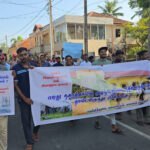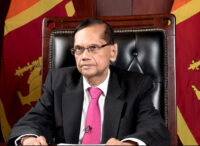A three-judge bench of the Supreme Court, headed by the Chief Justice, took up SC/FR/166/25, a landmark fundamental rights petition filed on July 30, 2025 by Lina Amani Rishard Hamid, an LLB undergraduate and the youngest citizen ever to bring a matter of such scale before Sri Lanka’s highest court.
The petition questions the government’s decision to place Sri Lanka’s electronic national identity system (e-NIC) under an arrangement backed by the Government of India.
The case argues that Sri Lanka’s most sensitive biometric data must remain under the control of its own people and institutions, not placed into foreign hands.
Who Has Been Brought Before Court?
The petition names 28 Respondents in total. This includes the President of Sri Lanka, represented through the Attorney General in terms of Article 35(1) of the Constitution, the Prime Minister, the Cabinet of Ministers from the 2nd to the 22nd Respondents, and senior officials including the Secretary to the Cabinet of Ministers, the Secretaries to the Ministries of Digital Economy, Defence, and Finance, the Commissioner General of Registration of Persons, and finally the Attorney General himself as the 28th Respondent.
This wide scope makes clear that responsibility for the Indian-backed arrangement is not limited to one or two individuals, but extends to the full Cabinet and the machinery of government.
Legal Grounds
The petition argues that Sri Lanka’s sovereignty is inalienable under Articles 3 and 4 of the Constitution, and cannot be compromised through agreements with foreign states. It highlights that Cabinet decisions of January 27 and June 2, 2025, which advanced the India-backed MoU, were taken in secrecy, denying Parliament and the public the right to debate or review them. Such secrecy, it argues, violates Article 14A (Right to Information) and bypasses safeguards under Article 157 for international agreements.
It also stresses that Sri Lanka’s own e-NIC system, developed by local engineers and more than 80 percent complete, is ready to be rolled out today as a domestic solution. Instead of finalizing this project, the government has chosen to push the system under an Indian-backed framework, which the petition warns would compromise data sovereignty, national security, and long-term independence.
Proceedings Today
At the hearing, the Attorney General’s Department admitted it had received notice but confirmed that the President, Prime Minister, and other Respondents had not yet been served due to government delays. The Chief Justice directed the Attorney General to issue notice to all Respondents without delay. The case has been fixed for further hearing on October 17, 2025.
Representation and Credit
The petitioner is represented by Attorney-at-Law Kanishka Vitharana and supported by The Nationalist organization, which has consistently raised the alarm about foreign-backed arrangements undermining Sri Lanka’s sovereignty.
Lina Amani Rishard Hamid, who, despite being a law undergraduate, has taken on the responsibility of filing a case that protects the rights of all 22 million Sri Lankans.
“This is not about me. This fight is for the sovereignty of 22 million Sri Lankans. Our identity must remain in our own hands, not under the control of another government,” she said after the hearing.
Why This Case Matters
This case is now being recognised as a defining test of Sri Lanka’s digital sovereignty. The outcome will decide whether the country completes its own e-NIC system with domestic expertise and national control, or whether it surrenders its most sensitive identity infrastructure to the influence of an Indian-backed arrangement.











Leave a comment